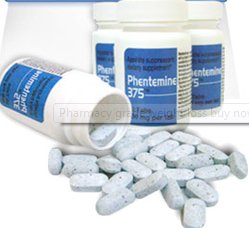Ephedra
MANUFACTURERS/BRAND NAME: Also known as ma huang, Mormon tea, cowboy tea, squaw tea, and desert herb. Although it is not readily available as a single supplement, it is a major ingredient in many popular diet products, such as Metabolife, and herbal fen-phen products, among others.
SOLD AS: Powder, tincture, tablets, and decoction.
WEIGHT LOSS PILL TYPE: Thermogenic agent, decongestant. Ephedra is an herb that contains a potent substance called ephedrine, which many pharmaceutical companies make in synthetic form and put in over-the-counter drugs to treat respiratory problems, including colds, bronchitis, asthma, and whooping cough.
BACKGROUND/RESEARCH: Ephedra has been the subject of much research and has been found to be potentially dangerous, especially when used for weight loss. A combination of ephedra, green tea, and kola nut, commonly used to raise the metabolic rate and thus help in weight loss, can cause damage to the heart and the nervous system. At least forty people have died and more than 800 have become ill after taking diet products that contain ephedrine, including the sudden death of a college student in 1997. Some states have outlawed the use of ephedra or placed severe restrictions on its use because of its ability to cause serious reactions, as well as increased blood pressure, uncontrolled sweating, and increased blood flow to the brain.
The manufacturers of ephedra products insist that the herb is safe. The FDA, which had been trying to regulate the supplement, is now trying to get warning-labels placed on the products. Strong evidence to support such warning labels appeared in two different reports. In May 2000, scientists noted that many labels of products containing ephedra were not accurate. The researchers checked twenty different brands, and in ten, the amount of active ingredient varied from the stated amount by 20 percent or more. One product did not contain any ephedra, and several brands contained possibly dangerous combinations of ephedra and caffeine and other products.
However, another study, also made public in December 2000, claimed that ephedra is safe when taken at a dosage of 90 mg to 150 mg 3 times a day. The announcement, made by the Council for Responsible Nutrition, was the result of a study that analyzed nineteen clinical trials of ephedra. The reviewers concluded that ephedra did not cause any adverse reactions at the 90-mg~per-day dose and only minimal side effects at 150 mg per day. According to John Cordano, president and CEO of the Council for Responsible Nutrition, the FDA’s reports of problems with ephedra were incorrect because they contained incomplete information, were based on taking the supplement with other products, or the doses taken- were too high. He cautioned, however, that anyone who has heart disease; coronary thrombosis; diabetes; glaucoma; hypertension; thyroid disease; poor cerebral circulation; renal problems; an enlarged prostate; or adrenal tumors should not take ephedra.
WHAT IS IT SUPPOSED TO DO: Ephedra contains the active ingredients ephedrine, pseudoephedrine, and norpseudoephedrine, which stimulate the cardiovascular and central nervous systems. Ephedrine stimulates the beta receptors in the fat cells, which then turn on the process known as thermogenesis, which burns fat and produces energy.
HOW TO TAKE IT: In as much as this substance has been associated with or led to the deaths of numerous people and medical problems in many others, it would be irresponsible to offer suggestions for its use, especially when safer alternatives are available. Those alternatives can be found here or read below.
SIDE EFFECTS: Ephedrine causes heart palpitations; dry mouth; insomnia; headache and dizziness; an increase in blood pressure, metabolic rate, perspiration rate, and urine output; and a reduction of the secretion of stomach acid. In some cases it can cause paranoid psychoses; coronary spasm; convulsions; respiratory depression; coma; and death.
PRECAUTIONS: Never use ephedra or products containing it unless you are under the supervision of a physician. Do not consume coffee, tea, or other caffeinated products when using ephedra. People with heart disease; high blood pressure; thyroid disease; nervous disorders; or poor digestion; who are weak or who experience insomnia or excessive perspiration; who are pregnant or breast-feeding; or who are taking any types of medications, especially those that increase blood pressure, should not use ephedra. If you are over age sixty-five, consult your doctor before using this product.
Best Diet Pill having a mechanism similar to Ephedra
PhenQ and Phen375 are easily the best weight loss pills since they act both as an appetite suppressant as well as thermogenic fat burner thereby providing the best value for money. Read more.
Herbal Phentermine/Ephedra for weight loss
Phen375 incorporates everything that made Phentermine so effective at promoting weight loss, and has done away with all the negative side effects
associated with the original diet pill. Works both as an appetite suppressant and a fat burner.
Phen375 contains 1,3-Dimethypentylamine Hydrochloride that has a mechanisms very similar to ephedra. We highly recommend Phen375. It’s like having phentermine and ephedra in the same pill without side effects!
Weight loss products containing ephedra
[catlist id=16 orderby=date order=asc numberposts=-1 excerpt=yes ]

